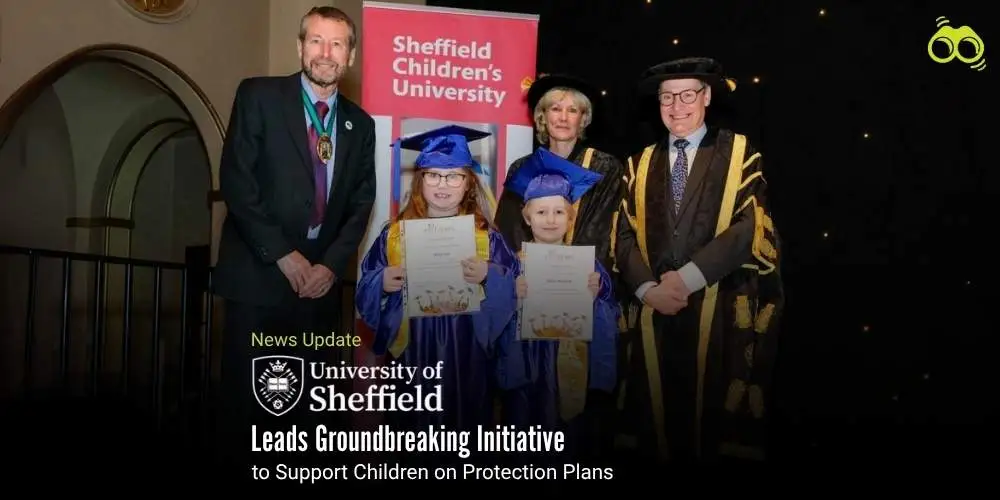Sheffield Partners with Charities to Tackle Barriers in Higher Education
Sheffield-Led Consortium to Address Gaps in University Access for Protected Children
A pioneering initiative led by the University of Sheffield is set to address one of the most overlooked challenges in widening access to higher education, supporting children under Child Protection Plans (CPPs), who are considered at risk of significant harm. Funded by the Office for Students’ Equality in Higher Education Innovation Fund, the project brings together a consortium of charities and educational institutions, including The Brilliant Club, London Academy of Excellence Tottenham (LAET), and Frontline.
The consortium has highlighted that children under CPPs are among the most disadvantaged in education, yet they remain largely absent from university access schemes and contextual admissions processes. In 2024, approximately 49,900 children in the UK were under CPPs, with only 8.9% achieving a grade 5 or above in GCSE English and maths, figures comparable to outcomes for children in care. Their Attainment 8 scores were similarly low, and progression to higher education was so rare that government data is typically suppressed for confidentiality.
Although protection plans formally end at age 18, project partners argue that their impact often continues into adulthood and should be considered in university admissions and support policies. From 7 to 11 July, representatives convened at the University of Sheffield to review early findings and consult with social workers, educators, and young people with lived experience. The first phase of targeted support is expected to launch by January 2026.
Plans include tailored outreach programmes for Key Stage 3 students under CPPs, to be piloted in South Yorkshire and London during the 2025–26 and 2026–27 academic years. Imperial College London has also joined the initiative to help extend its geographical reach. Professor Mary Vincent, Vice-President for Education at the University of Sheffield, acknowledged that while some children face serious challenges during their schooling, these should not prevent them from reaching their potential or pursuing higher education. She emphasised that children under protection plans remain overlooked, despite progress in widening access, and reaffirmed the university’s commitment to working with specialist charities and partners to better support their educational journey.
The initiative draws on Sheffield’s experience in supporting care-experienced students, while leveraging the expertise of its third-sector partners. The Brilliant Club contributes its knowledge in raising academic attainment and university confidence among disadvantaged pupils, while Frontline offers deep insight into social care and the barriers faced by vulnerable youth. LAET and its feeder schools bring valuable frontline perspectives, ensuring that university responses are informed by real challenges faced in schools.
Susie Whigham, Interim CEO of The Brilliant Club, noted that children on protection plans are among the most underrepresented in higher education, with progression rates even lower than those of care-experienced young people. She stressed the importance of combining expert knowledge with lived experience to better support this group. Similarly, Elaine Brown, Deputy Headteacher at LAET, highlighted the lack of formal support for these students post-18 and expressed hope that the partnership would raise awareness and improve outcomes. Lisa Hackett, Chief Social Worker at Frontline, described the initiative as a vital step in recognising the potential of children under protection plans and amplifying their voices. This initiative marks a significant move towards ensuring that safeguarding history does not limit a young person’s future in education.
Editor’s Note
The University of Sheffield’s new project to support children under Child Protection Plans (CPPs) is an important and much-needed step. These children often face serious challenges growing up and are among the least likely to go to university. Despite this, they are usually left out of university access programmes, and their numbers in higher education are so low that the government does not even publish full data about them. Universities often neglect the lasting impact of early challenges on young people who have been on protection plans, even after they turn 18. This oversight disadvantages an already vulnerable group. However, projects like the one led by Sheffield, with support from various organisations, demonstrate the positive outcomes when universities actively engage with social workers, educators, and those with lived experience. This collaboration fosters effective solutions, such as early outreach and flexible admissions, which are crucial for success.
Skoobuzz emphasises that universities should adopt Sheffield's model, which emphasises re-evaluating admissions, providing trauma-informed staff training, and fostering closer ties with schools and care services.














0 Comments (Please Login To Continue)